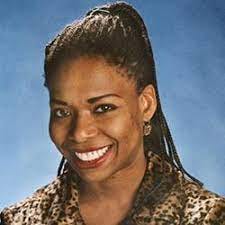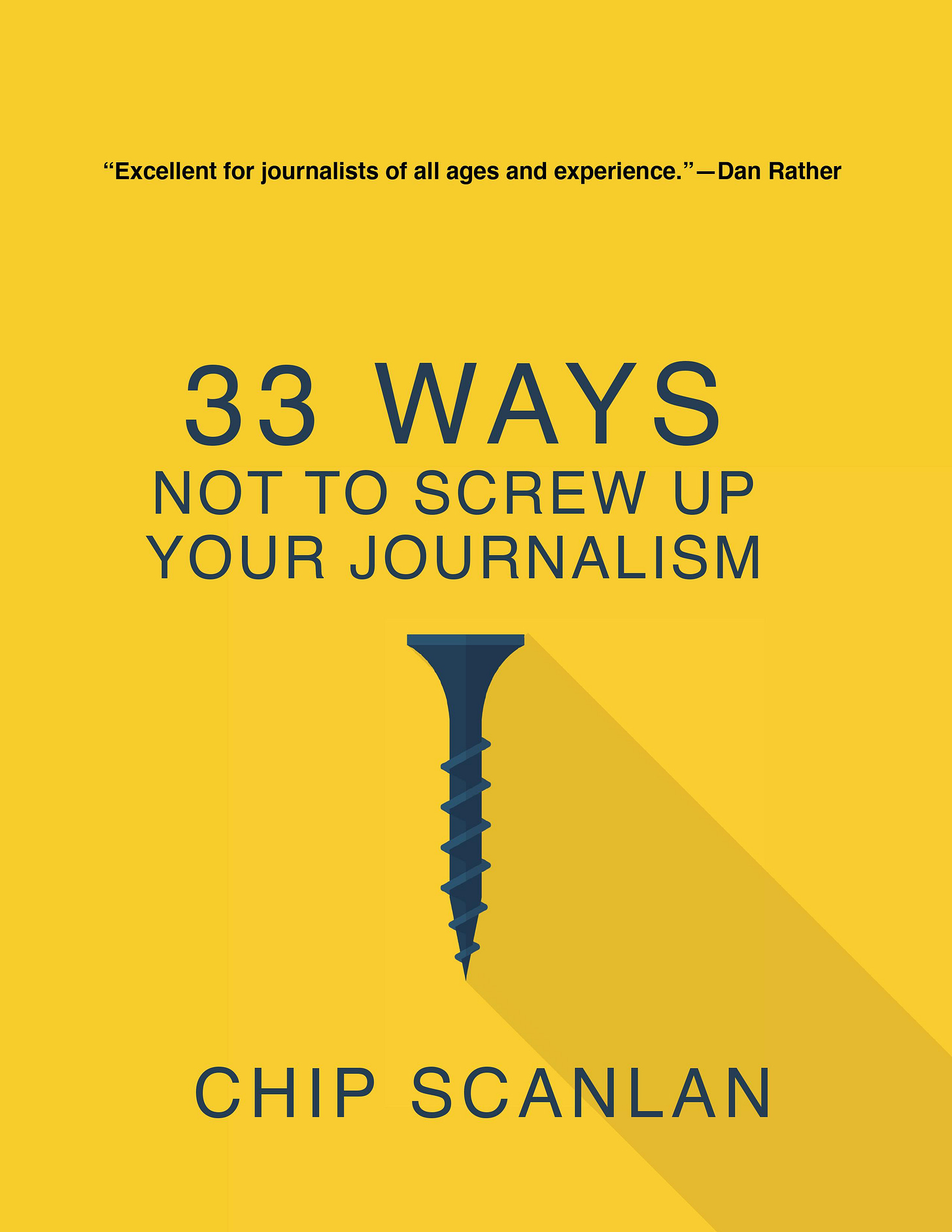In this issue:
Writers Speak | Louise Erdich on a writer’s desire
Interview | 4 Questions with DeNeen L. Brown
Tip of the Week | Said vs. Says
Help Royal Hospitallers save lives in Ukraine
WRITERS SPEAK
"Part of becoming a writer is the desire to have everything mean something."
- Louise Erdich
Chip’s Writing Lessons is a reader-supported publication. To receive an Extras package in addition to my free newsletter, become a paid subscriber for $5 a month, $50 a year, or $150 annually to become a Founding Member.
INTERVIEW | 4 QUESTIONS WITH DENEEN L. BROWN
DeNeen L. Brown joined the University of Maryland Philip Merrill College of Journalism faculty in 2019 after more than three decades at the Washington Post.
Since coming to UMD, she has continued to write for the Post, including a series of stories on the deadly 1921 Tulsa Race Massacre, which led to the city’s mayor reopening an investigation into suspected mass graves.
Among other jobs at the Post, Brown has covered police, courts and education, and was a foreign correspondent. She was a staff writer in the Post’s Metro and Style sections and a staff writer for the Washington Post Magazine. Brown has earned national recognition for writing narratives about the middle class, the homeless, culture, race, Black history, urban gentrification, poverty and the environment.
As the Post’s Canada bureau chief from 2000 to 2004, she traveled throughout the Canadian Arctic and Arctic Archipelago to write about climate change, melting permafrost, receding glaciers, indigenous populations and cultural erosion. She also has written dispatches from an icebreaker in the Northwest Passage and covered stories from Greenland and Haiti.
She has won national feature-writing prizes from the American Society of News Editors, the National Association of Black Journalists, the American Association of Sunday and Feature Editors, as well as regional awards from the Maryland, Delaware, District of Columbia Press Association. In 2006, Brown’s story titled “Mr. Wonderful” won first place and the best-in-show award for daily writing from the Virginia Press Association.
Brown is a former Knight Fellow and Washington Post Media Fellow at Duke University. She has taught writing seminars at Harvard’s Nieman Conference on Narrative Journalism and has been a guest lecturer on narrative writing at the Poynter Institute for Media Studies in St. Petersburg, Florida.
Brown has taught writing at National Writers Workshops around the country and at the American Association of Sunday and Feature Editors conference. She was also an adjunct journalism instructor at Georgetown University.
Her essays about writing are published in Telling True Stories: A Nonfiction Writers’ Guide. Her award-winning narratives are published in Best Newspaper Writing 1999: The Nation’s Best Journalism.
Brown holds a bachelor’s degree in journalism from the University of Kansas.
What is the most important lesson you’ve learned as a writer?
Phillip Dixon, a great city editor at the Washington Post, once told me, “Evoke the soul of the story.” I was a young reporter then. I remember walking away from the city desk thinking he was a curiosity. I had no idea what he was talking about. I went to my desk and rewrote the story. But, again and again, he would send it back with the mysterious instruction: “Evoke the soul of the story.”
Over time, I came to understand what he meant. “Evoke the soul of the story” meant to report so deeply inside a story that you understand the story and the characters perhaps better than they understand themselves.
Evoking the soul of the story means, “Don’t just tell me what so-and-so said and what so-and-so did. But tell me what so-and-so said and meant to say and why he said it and what brought him to this point in life that would make him say what he said or do what he did. What motivates this character deep inside?”
Evoking the soul of the story means that writers should reveal a character’s deepest fear and desire. Who are they when no one is looking? Long-form narratives are made richer by immersive reporting. The best stories are not about the writing, but about what is revealed in the reporting.
What has been the biggest surprise of your writing life?
The biggest surprise in my writing life came when I found out just how a great story has the power to change someone’s life. A story, reported deeply and written with an authentic writer’s voice, has the power to move readers. I’ve seen readers respond in droves to help a homeless woman who rode a bus as her bed. I’ve seen powerful stories move institutions. Words have that kind of power. I’m still a bit in awe of the power of words.
If you had to use a metaphor to describe yourself as a writer what would it be and why?
When I sit down to write, I feel like a composer. Though I am not a musician, I go through the steps that a musical composer might take in creating music. Composers and writers are both creating something out of nothing. We look at a blank page and fill it with something that lives.
In the writing process, I often imagine flipping my coattails before sitting on an imaginary piano bench, the way a composer might. I imagine the computer keyboard is my piano. The words come like songs out of nowhere. They have rhythm. I hear the stories as I write. The cadence and the spacing are important to me. The way words are arranged on the page are like notes.
I think good stories, like any good song, have a rhythm. Like a good Aretha Franklin song, they have soul. Like a Miriam Makeba song, the words ebb and they flow. Like James Brown, they repeat themselves. They grunt and grind. They rise and they fall. And sometimes they just shout.
What is the best writing advice anyone ever gave you?
Margaret Atwood once told me that writing is like diving into a black hole. The writer dives into an abyss and emerges hours or days later with a story.
I will never forget that afternoon with Atwood. I had gone to a café in Toronto to interview her. I read most of her books in preparation. But instead of talking about her latest book, we talked about life and writing.
I asked her where she got her confidence as a writer. She told me she had none, that each blank page scares her. The trash can, she told me, is her friend. She explained how certain books drive her and how some of her characters live in her writing desk drawer until they are ready for her to write their stories.
So many years later, when I face a blank screen, I think of Atwood telling me to write past the fear, dive into the void and fill up the blank page with story.
TIP OF THE WEEK | SAID VS. SAYS
In the past, I’ve made the case for using the verb “said” as speaker attribution, also known as a dialogue tag. But what about “says,” a favorite of feature writers who use the present tense to convey that the story is unfolding before the reader’s eyes? It’s a subject of debate. Some editors and critics abhor its familiarity and consider it an overindulgence because stories occur, by temporal default, in the past.
But Jan Winburn, editor of Pulitzer and other prize-winning features, has no problem with its present tense.
In a feature story, particularly one in which a reporter is writing in scenes and describing the actions and thoughts of a character (as opposed to quoting a source), she thinks any technique that helps keep the reader immersed in the moment is useful. The present tense is one strong method for doing that. So “says” would be applicable, as would present tense throughout. It makes the use of active verbs come easily. And active verbs are the muscles of good writing.
As a feature writer, I often employed “says,” believing that it subtly conveyed the action was happening in real time before the reader’s eyes. The bottom line: When it comes to this issue, it depends — on your intent, your publication’s style, your editors’ preference and how those verbs of attribution sound.
HELP UKRAINIAN PARAMEDICS SAVE LIVES
Royal Hospitallers, Ukrainian's brave volunteer paramedic battalion, save lives every day. Please support them here!
BEFORE YOU GO
If there’s one person — a journalist, writer, student, teacher or coach — you think would benefit from the interviews, craft lessons, writing tips, and more that appear every two weeks in this free newsletter, please suggest they subscribe @chipscanlan.substack.com
If you’d like to tangibly support Chip’s Writing Lessons and my work, please consider becoming a paid subscriber for $5 a month or $50 a year or for $150 a year to become a founding member. Once a week, these members receive an Extras package featuring fresh interviews with leading writers and editors, excerpts from my books of writing advice, excerpts from my African memoir in progress, more inspirational quotes, glimpses into the world of publishing, coaching tips and more recommended readings and listening options.
NOW AVAILABLE
33 Ways Not To Screw Up Your Journalism
Writers on Writing: Inside the lives of 55 distinguished writers and editors
“By asking four questions to 55 of our finest writers and editors, Chip Scanlan has hosted one of the greatest writing conferences you will ever attend." - Roy Peter Clark, The Poynter Institute, “Writing Tools”
"A marvelous book for writers, people who have a passion for writing, or simply, who want to become writers. Yet what strikes me about this book is that it is not just for writers only." - The Blogging Owl
AND
Writers on Writing: The Journal
Available on Amazon or online through Tombolo Books, a local independently-owned bookstore @ writersonwritingbooks.com
chipscan@gmail.com | +1-727-366-8119. Feel free to call. Always happy to give a free 30-minute consultation.
Thanks for reading. See you in two weeks.
May your writing and editing go well.
Chip
Like this post







Thanks so much, Faith!
Wow I have learnt a whole lot.